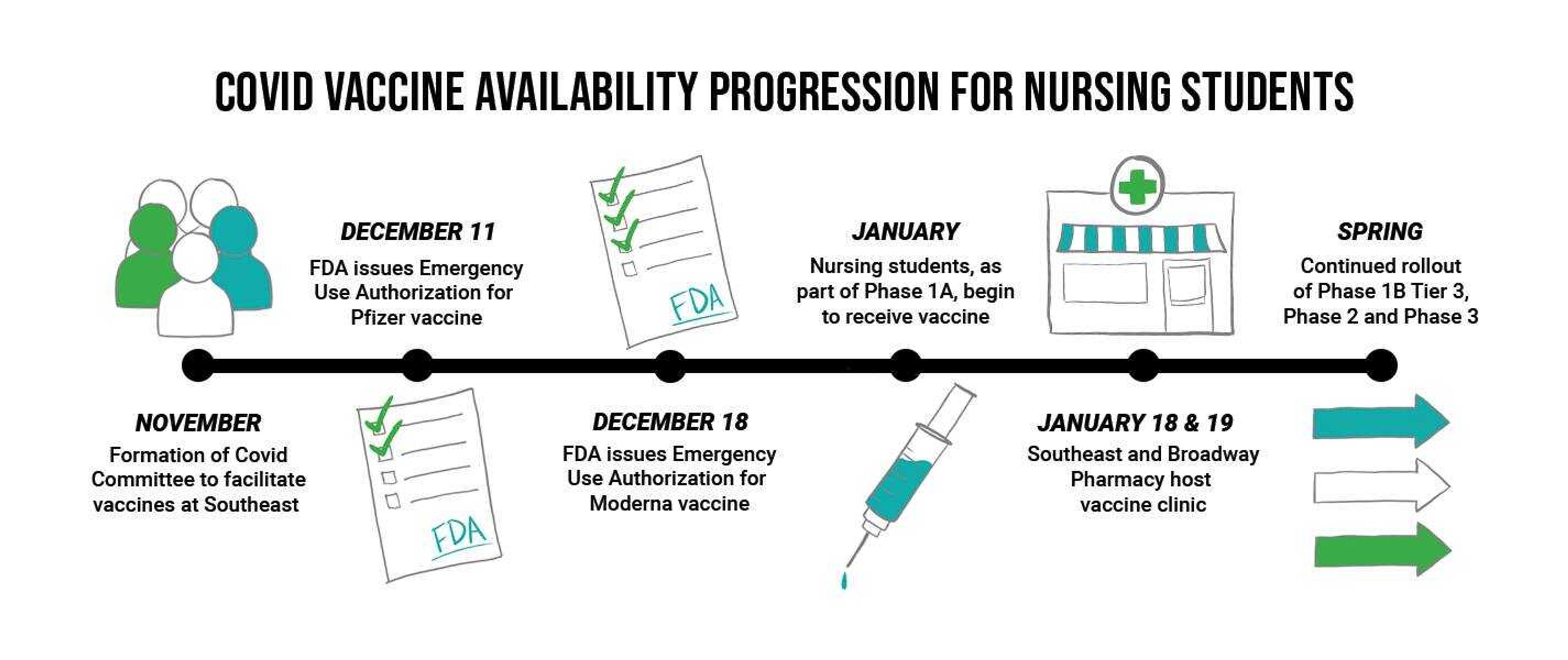For Allison Muenster, working high-stress shifts with COVID-19 patients has only strengthened her passion for nursing.
“It made me realize that I am capable [of doing] this job, and I was in the right field,” she said.
The Southeast senior works 60 hours each week at Mercy South in St. Louis as COVID-19 clinical support. She belongs to a group of Southeast nursing students that have received the COVID-19 vaccine as part of Missouri’s Phase 1A rollout plan, which includes medical professionals.
Her day starts at 7 a.m. in the COVID-19 unit with the day’s floor assignment. While her tasks differ from day to day, she’ll often spend her 12-hour shifts restocking isolation gowns, talking with medical staff, taking vitals and meeting with patients. She said she assists patients in video chatting with loved ones and elects to work full 12-hour shifts instead of the four-hour option.
Helping to care for virus patients isn’t easy; Muenster said patients can go from “getting better to getting worse” in a short amount of time. “Code blue” calls are her most stressful moments — when a patient stops breathing, nurses must perform CPR to resuscitate them.
“It really breaks my heart and makes me realize how real this pandemic is,” she said. “I see death every day.”
Director of the Undergraduate Nursing Program Corrie Dudley is part of the department’s COVID Committee, which supports students and faculty in receiving vaccinations. She said for those working directly with patients, vaccinations are the light at the end of the tunnel.
“Ninety-five percent effectiveness [for the vaccine] means that it’s not perfect, but it is protection,” Dudley said. “It’s something that I believe will help us feel safer giving that care.”
Lauryn Torluemke, a senior nursing student at Southeast, works as a patient care tech at Progress West in O’Fallon, Mo., and Barnes-Jewish St. Peters Hospital. During a typical shift, she said she completes tasks such as taking vitals and assisting patients in visiting the restroom. She also participates in training clinicals during her Southeast coursework.
Clinical sessions for Southeast students require a surgical mask, eye protection and daily symptom checks. Torluemke said students this semester will be required to use the Wellness Center app to participate in clinicals. The app, affiliated with Castlebranch, comes with a $30 subscription price and ability to log temperature, COVID-19 exposures and any symptoms.
Barnes-Jewish Hospital vaccinated employees on a tier by age and exposure, Torluemke said. She received the first dose of the vaccination Jan. 6. She said she wasn’t initially sure if she wanted to get the vaccine, as she didn’t know the long-term side effects. After speaking with her mother, who is also a nurse, she decided to receive the vaccine.
She says what finally swayed her is other nurses’ perspectives on the long-term effects of the vaccination versus the long-term effects of COVID-19 they’ve seen. The nurses, after treating patients with long-lasting effects of the virus, reasoned the vaccine would be much safer.
“It’s honestly easier than the flu [shot],” Torluemke said. “My arm hurt a little bit when I rolled over in bed the next night, but I worked a full 12 [hour shift] the next day, and I didn’t feel anything.”
Dudley said the COVID Committee, composed of six faculty members at Southeast, formed a partnership with Broadway Pharmacy to offer vaccination clinics Jan. 18 and 19. Prior to the clinics, Dudley said 15 to 20 students had received the COVID-19 vaccine. Forty-five to 50 individuals were signed up to get the shot during the two-day clinic.
Beyond personal protection, she said nursing student vaccinations help build community immunity and expand students’ service opportunities. Students may feel more comfortable assisting in vaccinating others if they’re already immune themselves. Dudley said many medical professionals are more concerned about carrying the virus to those close to them.
“Having the vaccine will make us feel less of a risk to the people that we love,” Dudley said.
Muenster’s mother was the first in her family to receive the vaccine. While Muenster herself said she was initially hesitant about the long-term effects and was very “back and forth” about whether to receive the vaccine. Ultimately, she said she trusts doctors and researchers created a safe solution to the pandemic.
She received the first shot Jan. 4 and the second Jan. 22. It allows her a safer way to continue the career she loves.
“Seeing these patients with not being able to see their families, just going in and spending a few minutes with them and talking with them, it can make their whole day,” Muenster said. “Just simple stuff like that made me realize how important we are to patients and to their families.”
Missouri is currently vaccinating Phase 1A, Phase 1B Tier 1 and Phase 1B Tier 2, which includes health care workers, first responders, emergency services, high-risk individuals and older adults. While progression in the vaccine rollout depends on availability and other factors, the next step — Phase 1B Tier 3 — will include educators in K-12, childcare workers and government employees, among other select essential workers. Phase 2 will include essential workers, disproportionately-affected communities and individuals who are homeless. Phase 3 vaccinates all Missouri residents. For more information, visit https://covidvaccine.mo.gov.




